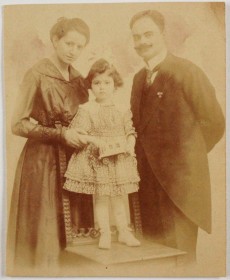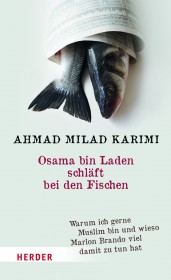Shortly after the opening of our temporary exhibition “Snip it!”, the Jewish Museum received as a bequest the estate of Fritz Wachsner (1886 – 1942). Included in this delivery was a bundle of letters so enormous that I didn’t have time, in creating an inventory, to delve into each individual piece. But one letter caught my attention. “[…] Your assessment of the circumcision issue […]”, wrote Wachsner on 24. July 1919 to his – then very pregnant – wife Paula’s uncle Anselm Schmidt (1875 – 1925). I read on and suddenly found myself in the middle of a nearly one-hundred-year-old internal Jewish debate on circumcision.

Fritz Wachsner with his wife Paula and their first-born child, Charlotte, studio portrait, ca. 1916 © Jewish Museum Berlin, photo: Jörg Waßmer, Gift of Marianne Meyerhoff
At the time, Fritz Wachsner was 33-year-old teacher in the town of Buckow in Brandenburg. In the five-page letter he clarifies the reasons for his hostile stance towards the Bris. He was an assimilated German Jew and belonged to a Reform Jewish congregation. As he explains to his uncle, he was “raised fairly orthodox” but, in the course of his university studies in Berlin and Jena as well as at the Academy for the Study of Judaism in Berlin, he learned “to know and appreciate the spirit of Judaism freed from every non-German embellishment”. He became persuaded that the religion should evolve continually and be “modernized and improved”. Wachsner’s maxim was: “Become German, outside as well as inside the religious community”, the overtones of which are especially → continue reading
“New German Stories,” an event series launched in January 2014 as part of the Academy program, continues this evening, 10 March 2015, when Ahmad Milad Karimi, Professor of Islamic Philosophy and Mysticism at the University of Münster, presents his new book Osama bin Laden is sleeping with fishes (Osama bin Laden schläft bei den Fischen) at the Academy of the Jewish Museum Berlin. We put three questions to our guest, prior to the event.

Ahmad Milad Karimi: Osama bin Laden is sleeping with fishes (Bookcover) © Herder Publishers
Julia Jürgens: Dear Mr. Karimi, in your autobiography you bring together Western popular culture and the history of Islamic intellectualism, the translation of the Koran and your PhD thesis on Hegel, Persian mysticism and a penchant for mafia films. If I may make a question of your book’s subtitle: What does Marlon Brando have to do with the pleasure you take in being Muslim?
Ahmad Milad Karimi: That is a secret of the book, a secret concealed first and foremost by the fact that there is always more to people than the pigeonhole we like to keep them in.
Six years ago you published your new translation of the Koran. What motivated you to take up such a challenge and add a new translation to those already in existence?
The Koran is more than simply a book—it is → continue reading
Purim is a family celebration, a time when children dress up, make a great din with rattles and gorge themselves on traditional Haman sweetmeats. By so much merriment it seems a little astonishing to recall that this religious holiday is actually rooted in a Bible story that is anything but happy and G-rated.

King Ahasuerus falls in love with Esther © photo: Shlomit Tulgan
The Book of Esther, which is read on Purim, tells of how the orphan girl Esther carries out a spectacular operation to rescue the Jewish people from the hands of King Ahasuerus, ruler of the Kingdom of Persia. The anonymous author recounts this story in the style of an epic poem and thereby suggests that God plays only a minor role in the proceedings. He turns the spotlight instead on the cunning with which clever Esther and her Uncle Mordechai manage to stop vizier Haman from realizing the pogrom he has planned against the Persian Jews. → continue reading


